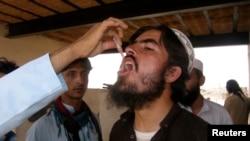Pakistan is the only country where poliovirus is still spreading fast. This year, 208 cases of paralysis were recorded, accounting for 85 percent of worldwide victims. The country is coming under extreme pressure to contain its infections and boost vaccinations, or face isolation.
The number of children paralyzed by polio in Pakistan this year is the highest since 2000, when authorities recorded 199 cases.
Ayesha Farooq, who heads the prime minister’s special polio-eradication cell, said the government is approaching the problem with what she calls a “war footing.”
“The government at all levels is making a renewed commitment to work towards making the upcoming low transmission season (January to April) to be the last that Pakistan, hopefully, gets to see. Just as Pakistan threatens the world in spreading this virus our own high-risk areas threaten spreading the virus to safer areas of Pakistan,” said Farooq.
Pakistan launched emergency polio eradication efforts in 1994. Over the next decade, the number of cases dropped from around 25,000 to just 28. But new infections still persisted and now are increasing, in part because Islamist militants have hampered vaccination campaigns.
Elias Durry, the World Health Organization’s senior emergency coordinator for Pakistan's polio program, warns that by the end of this year, the country is likely to become the only one still spreading the virus globally.
“If we miss this next year then we will be really in a deep hole that it may be very difficult for us (Pakistan) to come out and more variables may come out and drag us more into not being able to finish it. But this is the only chance where Pakistan can say this is the last chance,” said Durry.
He emphasized the need for enhanced immunization efforts in Karachi, where polio is now showing up in sewage samples taken from all over the largest Pakistani city.
Pakistani officials acknowledge there have been management and accountability problems in its polio vaccination program. But Farooq said security has become “the gravest challenge,” with 90% of new cases in what she calls “security compromised” areas.
“These are areas where there was either a ban, there is a ban [on vaccination drives], these are areas where you have active militancy, or these are areas where our polio teams had been threatened, they had been attacked. And by the way, Pakistan is the only country in the world to have lost more than 64 people, both polio vaccinators as well as police escorts providing them security, to this war against polio," said Farooq.
Officials say that the security challenge magnified in 2011 after it was revealed that the CIA organized a fake Hepatitis B vaccination drive as a cover to try to gather evidence from al-Qaida leader Osama Bin's hideout in Abbottabad.
In 2012, the Pakistani Taliban banned vaccinations in their strongholds of North and South Waziristan.
Pakistan and World Health Organization officials say the ban deprived as many as 350,000 children of polio vaccination for two years in a row, turning the Waziristan territory into the biggest “polio sanctuary” in the country.
Pakistan’s army has been conducting major counter-insurgency operations since June to rid the Afghan border region of militants. The fighting has forced tens of thousands of tribesmen to flee to nearby cities. Pakistani WHO officials attribute the jump in the number of cases this year to the sudden influx of so-called Internally Displaced Persons or IDPs.
Farooq, however, said the situation also has offered an opportunity.
“Since the exodus of the IDPs from Waziristan to date we have been able to vaccinate 750,000 IDP children. So, we are very hopeful that this polio sanctuary, which was Waziristan area, which was completely inaccessible because of the ban, this recent operation has given us a hope, the polio program a capital opportunity to target those children that, out of no fault of their own, we were not able to reach and vaccinate,” said Farooq.
WHO’s country representative, Dr. Michel Thieren, said he is optimistic Pakistan can bring the polio outbreak under control.
“We should be concerned but not afraid about the situation of today. We know that vast majority of those children are children that have not been reached out for the past one or two years in some regions. We still believe and we are confident that we can eliminate polio of Pakistan next year or at least put Pakistan in a situation where elimination will be very obvious and very quick,” said Thieren.
Pakistani officials say families across the country continue to refuse vaccinations because of religious, medical or other misconceptions attached to the polio vaccine.
Imtiaz Ali Shah heads the polio program in the violence-hit northwestern Khyber Pakhtunkhwa province, where most polio cases are located.
Shah said health workers still are struggling to help families understand why polio immunization is more important than more common diseases, such as diarrhea and pneumonia, that sicken and kill many children in Pakistan.
“So that is basically… [causing] confusion in their minds, that at one hand the government is coming to our doors our houses and vaccinating our children and protecting them from a disease that… [has not yet harmed] them, and they are not providing any services when we are ill and when we need the services,” said Shah.
Pakistani officials say a so-called polio-plus plan is being devised to bring some of the basic health facilities and benefits to the targeted communities to help remove some of the misperceptions and encourage them to get their children vaccinated against polio.
WHO officials also believe that by strengthening its national polio eradication system, Pakistan can also keep out the Ebola virus. This method was used to great success in Nigeria, where authorities turned polio campaign operation centers into emergency offices that helped stop the Ebola outbreak in a short period of time.




